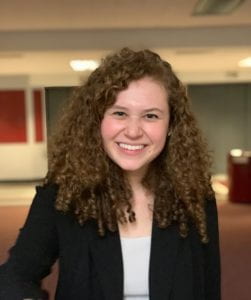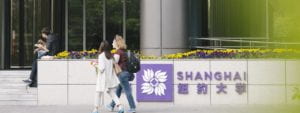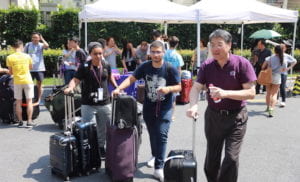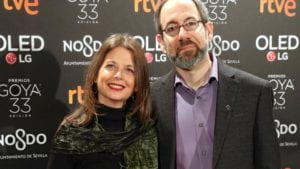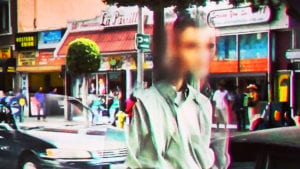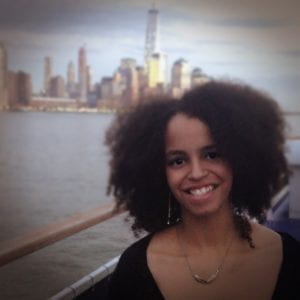 Mahalia Thomas was the first Global Equity Fellow in Berlin last academic year. The NYU Global Equity Fellowship is a competitive year-long fellowship created by the NYU Office of Global Programs in partnership with the NYU Leadership Initiative and NYU Student Affairs. The purpose of this fellowship is to empower and equip a diverse body of students to advance diversity, equity, and inclusion while studying away. Our hope is that our fellows will broaden their capacity as leaders and change agents at NYU and beyond. During its pilot phase the Global Equity Fellowship was only for students studying at NYU Berlin, NYU Buenos Aires and NYU Sydney. As of Fall 2018, the program has been expanded to all 11 Global Academic Centers.
Mahalia Thomas was the first Global Equity Fellow in Berlin last academic year. The NYU Global Equity Fellowship is a competitive year-long fellowship created by the NYU Office of Global Programs in partnership with the NYU Leadership Initiative and NYU Student Affairs. The purpose of this fellowship is to empower and equip a diverse body of students to advance diversity, equity, and inclusion while studying away. Our hope is that our fellows will broaden their capacity as leaders and change agents at NYU and beyond. During its pilot phase the Global Equity Fellowship was only for students studying at NYU Berlin, NYU Buenos Aires and NYU Sydney. As of Fall 2018, the program has been expanded to all 11 Global Academic Centers.
NYU Berlin has created a similar in a local German high school. Part of the thinking behind this program was to provide Mahalia and future Global Equity Fellows with ‘colleagues’ at a German school enabling them better access to conversations about equity, diversity, inclusion, and identity outside the NYU context. Although Mahalia is now back in New York, we had the opportunity to connect with her about her experience.
Tell me a little bit about your field of study and how you came to NYU.
I am in my fourth year at NYU in a joint degree (B.A.-M.A.) program at CAS/GSAS in New York. Within the field of politics, my studies have shifted and transformed to find the niche that I am excited to explore: Comparative Constitutional Law focusing on its impacts on electoral politics. I began freshman year with the plan to join the International Relations track focusing on Europe, but as I began to get deeper into Africana and Urban Studies, I realized the amount that still needed to be accomplished in the United States in terms of social progress and equity. As such, my Undergraduate political journey was focused on the American Political Practice and Leadership Track that eventually brought me to Washington D.C. as a Global Leadership Scholar in the Spring of 2017. Throughout that semester, I was introduced to Constitutional Law, which – dry it may be at times – I found fascinating. I came to realize that a founding document like a constitution not only delineates the structure and exchange of power, but it also shapes a country’s culture, its aspirations, and can be an incredible catalyst for equity. As of now, I hope my Master’s Thesis to be a comparative study of Germany and the United States and the impact of higher standards in their constitutions (ex. Article I of the GG) on the rise of Alt Right Politics.
NYU first sparked my interest the summer after 10th grade when I went to NYC to study at the Alvin Ailey Dance Theater. At the time, I was going to the Governor’s School for the Arts and Humanity, which was a specialized high school for those who wanted to pursue a career in the arts. NYU had a solid dance department, and I almost applied to Tisch in 2014. However, as I came to terms with the end of my 12-yearlong dance training, my interest in NYU did not diminish. I ended up applying ED1 and was able to accept my position thanks to the financial and community support offered by the Martin Luther King Jr. Scholarship Program.
I understand that you were the first Global Equity Fellow (GEF) in Berlin. How did you become involved in the program and what did the fellowship mean to you?
By the time that I heard about the program, I had already applied and been accepted into the Berlin study away program. I remember receiving the email while I was at my D.C. internship at the Justice Policy Institute (a think tank focused on Criminal Justice Reform). The sender of the email, Krystal McLeod, made me realize the gravity of the position as she was a Truman Scholar and had worked on a number of tangible and important equity efforts at NYU. At that time and still ongoing today, I evaluate NYU’s pro-equity programs as either being cosmetic (i.e. to look good) or tangible (i.e. to make an impact). While reading the description for the program, all I could think was “This is something real!” and I couldn’t believe that I received the position only a few weeks later.
Something that has shaped my entire journey from moving to the United States to going to NYU and eventually getting to be the Global Equity Fellow was thankfulness and a want to give back. I would not have been able to make it as far as I have if it hadn’t been for particular teachers, friends, and mentors and the way that I want to thank all of them is by continuing their mission and supporting those I can. Because of this, the Global Equity Fellowship meant for me the opportunity to give back and pave a path for others. It was an exciting and, sometimes, intimidating experience, but I am incredibly proud of what I’ve accomplished especially in regards to the MLK Jr. Fellows.
What was most meaningful about your time at NYU Berlin?
Other than the work that I was able to do with the Global Equity Fellowship, the most meaningful thing about my time in Berlin was to rediscover Germany and my place in it. I’m originally from Frankfurt but moved to the United States at 7. I’ve been back periodically but never for more than a few weeks. This was my first time being back in over 5 years and as an adult with the knowledge of identity that I had gained over the years. Regardless of being in the US or in Germany, being biracial (African American and German) comes with particular challenges and internal questions, and it took me a long time to settle on identifying myself as a Black German when questioned about my ethnicity. One surprising discovery I made while in Berlin was the heterogeneity of the African Diasporic community. While in the United States (particularly in the South where I lived for 8 years) most Blacks trace their lineage back to slavery, this isn’t quite the case in Germany. From my understanding, Germany has had more stagnant migration patterns of Blacks from Africa, the United States, and surrounding nations such as the UK and France. This lack of a shared history and its impacts is something I hope to continue to explore if I have the chance to return to Berlin. At least, we can all agree that Mohrenstrasse is not an appropriate street name.
Another set of meaningful experience was the work I was able to do at the high school outside of my mentorship role in the MLK Jr. Fellowship. While I was only able to visit two classrooms during my time there, I enjoyed both immensely. The first was with a class of 7th graders where we did an exercise around what names mean and how names shape the way that society can see (and often judge) a person. This was followed by a Q&A where I ended up finding myself explaining the United States’ Separations of Power because they wanted to know if Trump would start a war. The second visit was to their most advanced English class where I held a workshop on inclusive language covering topics from non-binary pronouns, LGBTQ+ terminology, and contextualized salient identities. While exercises such as these are commonplace at NYU, it was completely new to them and it was interesting for them to explore concepts that have become so ingrained in the way I think about Inclusivity. It was also a fascinating learning experience for me as I got to see how identities of nationality and race were differently interpreted and internalized in Germany compared to the United States.
I understand you were involved with the launch for NYU Berlin’s Martin Luther King Jr. Fellowship program? Can you describe how the program developed and your role. What was it like working with the local fellows?
Much of the groundwork and relations building to get a program such as the MLK Jr. Fellowship program going was already completed by the time I arrived in Berlin. Nonetheless, hearing the passion and enthusiasm of the potential of this program from Gabriella, Linn, and Frau Dinter, I was excited for the opportunity to be a part of it. I helped with finding the name for the program which we based on my Martin Luther King Jr. Scholars Program, picking who our fellows were going to be, and, most importantly to me, getting to be their mentors for my remaining time in Berlin.
To answer the question of what it was like working with Mahir and Ecenur, I think it can be summarized by the first time we all met. Only a short time after they were selected, I set up a time to get to know them over coffee and I was immediately blown away. A conversation that I had predicted would be 30 to 45 minutes of awkward small talk turned into a 2-hour enriching conversation spanning the welfare system, US Politics, and the role of schools in created inclusive environments. I remember coming back to the dorms and just having to go up to my suitemate and rant about how amazing they were (and still are). It was an absolute blast getting to be their mentor and watching them grow as scholars and change makers.
I am incredibly proud of them and I am beyond thankful for having had the opportunity to be a part of their journey as Martin Luther King Jr. Fellows.
How do you think the fellowship enriches the lives of the fellows as well as the NYU Berlin community? Is it consequential for local communities?
I think that we, as a society, greatly underestimate the experiences and insights of those younger than us. I know this from having both experienced the diminished weight of my opinions in workspaces where I am the youngest as well as my grave error of thinking the fellows would just be “high school kids.” This is something that society as a whole and each person as an individual should work on and one way to do that is by providing the opportunities for “younger folk” (which I use a variable term depending on context) to be seen as equals first and foremost. By doing this, we eliminate the need to have younger folk prove that they deserve to take up space, which, from personal experience, can lead to diminished self-worth. This is how I hope the fellowship has enriched the lives of the fellows. It taught them that they have a right to take up any space they decide to enter and that their opinions are just as valid as anyone’s else’s regardless of age or educational attainment.
When Mahir, Ecenur, and I began the conversation about their fellowship project, it quickly became apparent that the topic would be LGBTQ+ Inclusivity, the longer and harder decision was the scope of the project. We decided that they would act as the conversation starters for their school on this topic using personal stories, statistics, and collective involvement. While I do think that the work that they’ve done is consequential for local communities, I think it is more important that it was impactful for them because one change is a beautiful thing and can have many rippling effects, but one person who has the excitement to make change (as both of them do) is an endless sea of possibilities for future change.
 On March 4, NYU Florence’s La Pietra Dialogues will host an event considering the history of European integration and the common market. Hosted by Davide Lombardo, a Lecturer at NYU Florence, the questions to be considered include:
On March 4, NYU Florence’s La Pietra Dialogues will host an event considering the history of European integration and the common market. Hosted by Davide Lombardo, a Lecturer at NYU Florence, the questions to be considered include:
